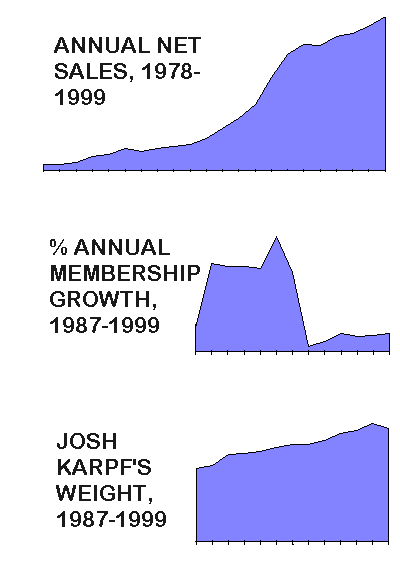 NO MORE FISTFULS OF PROXIES
NO MORE FISTFULS OF PROXIES
The General Meeting was microphoneless, thanks to Passover services held downstairs in the rented synagogue building. "We need to be respectful of that, as we are of each other," said the chair. I thought she meant ridiculous religious dicta like avoiding electricity, but it was just a noise issue. Some over-respectful GM attendees didn't even flush the toilets. The chair introduced three new cochairs-in-training, all fresh-faced and pink-cheeked. The chair herself maintained great cheeriness while ruling with an iron hand throughout the meeting.
In his financial report, coordinator Mike Eakin said that the recent gross margin was 16.33% -- close to the perfect percentage of 16.67, which would be achieved when there is no "shrinkage" loss from theft or breakage. He said that a "slight inventory error" at the beginning of the year may have reduced earlier figures. (So much for blaming thieves.) He also distributed two crowded tables showing annual membership growth and net sales. Graphed here but stripped of fiscally sensitive figures, the data shows annual sales and membership growth stagnating in 1994, six years after the last building expansion began in 1988. Only sales improve after 1994. Why would sales increase despite fewer members joining a coop crowded soon after its last expansion? One explanation could be that the coop began selling more high-profit packaged and nonfood items. Another conclusion, based on the third chart showing my weight gain during the same period, is that I personally have eaten enough food to increase coop profitability.
 Darlene reported that the Renovation Committee had sent Building Next Door plans to contractors for bids. Those would be due in early May and would finally determine project costs. The best bids may come from cheaper nonunion labor, which the committee knows would be controversial. Higher bids might mean a higher product-price markup, she said, and her committee had been "admonished" not to let that happen. She warned that if we didn't resolve the union-nonunion issue, some potential contractors might withdraw, and that might delay construction till September instead of starting it in May.
Darlene reported that the Renovation Committee had sent Building Next Door plans to contractors for bids. Those would be due in early May and would finally determine project costs. The best bids may come from cheaper nonunion labor, which the committee knows would be controversial. Higher bids might mean a higher product-price markup, she said, and her committee had been "admonished" not to let that happen. She warned that if we didn't resolve the union-nonunion issue, some potential contractors might withdraw, and that might delay construction till September instead of starting it in May.
Darlene's reminder that the past two coop expansions had been nonunion, and her suggestions that nonunion did not equal evil, dissatisfied many in the crowd. "It's not a trivial thing," insisted member Ethel Merman. She quoted the coop mission statement: "We strive to be a responsible and ethical employer. . . . Avoid[ing] products that depend on the exploitation of others." (The mission statement is long enough a catechism to support any do-gooder cause, and would not even have passed had voting not been extended indefinitely.) Other members too were outraged, one blaming "globalization." "If we can afford another building, we can afford union labor," one said eloquently but not necessarily accurately. An Agenda Committee member said that the next GM would address unionization. I predict that the GM will vote for union labor, forcing the Renovation Committee to plan a more Spartan renovation that will pay for New York City's famously corrupt construction unions' costs.
In other discord, Doyle Warren asked how the Renovation Committee's plans could have been made an amendment to the original plans. The original plans had been submitted to the New York City Department of Buildings by Warren's Project Development Team before top coordinator Joe Holtz had dissolved the PDT, and the original plans were the property of the PDT's contractor, Standart. Holtz replied that the filing to the Department of Buildings was the coop's property, even if drawings associated with the filing were not. Warren was incredulous and locked horns with Holtz till the chair muzzled them both.
General Meeting cochair Carl Arnold has grown very activist in the last few months. He had spearheaded the previous GM's discussion of how to oppose genetically engineered food, promoting that agenda and that agenda item. This night, he had a proposal to reduce the coordinators' influence on Annual Meeting elections of the board of directors. Coop members elect a board of directors because the board must, for legality's sake, okay the decisions of the monthly General Meetings. The Annual Meeting, which despite its election is even more boring than the General Meeting, always fails to have a quorum of 100 people. To maintain a quorum, the coordinators helpfully collect proxies from non-attending members.
But as dissent grows over coordinator decision making -- sometimes over the coop's commercial emphasis, sometimes over management problems, sometimes over the cut of Holtz's beard -- some board candidates began refusing to rubber-stamp some decisions of the coordinator-dominated GMs. To keep coordinator-friendly members elected to the board, Holtz began wielding those proxies. At the 1997 Annual Meeting, his fistful of proxies rejected blowhard member Ethel Merman and installed patsy Melinda Marx as a director, even though Merman had slightly more votes from Annual Meeting attendees actually present.
 Arnold's proposed solution: end the current use of undirected proxies, which allow a proxy holder to easily solicit unlimited power from many members. Instead, allow only directed proxies that authorize only specific voting, and aggressively mail those proxies to every member to sign and return. This would give the proxy-signing membership a greater chance to vote. It would also reduce Holtz's or any individual's ability to skew board elections. With such directed proxies, "the choice is up to the proxy signer, not the proxy holder," said Arnold. "An undirected proxy hands both judgment and decision to someone else."
Arnold's proposed solution: end the current use of undirected proxies, which allow a proxy holder to easily solicit unlimited power from many members. Instead, allow only directed proxies that authorize only specific voting, and aggressively mail those proxies to every member to sign and return. This would give the proxy-signing membership a greater chance to vote. It would also reduce Holtz's or any individual's ability to skew board elections. With such directed proxies, "the choice is up to the proxy signer, not the proxy holder," said Arnold. "An undirected proxy hands both judgment and decision to someone else."
Lively discussion was evenly divided between pro and con. Some pro comments came from surprising quarters. A former coordinator (who, to forestall sour-grapes accusations, admitted he had quit because he hadn't been promoted to the job Jessica Robinson won) said that for years he had urged the coordinators to support something like this. Member Jerry Whiner, normally a supporter of staff autocracy, complained that if he ran for the board ("I'm not planning on running; don't worry"), he wouldn't have the time or connections for gathering proxies, as Holtz would.
"Undirected proxies foster ignorance," intoned Dame Yadda Yadda. "Voting is an honor, privilege, a responsibility," said Lisa Nicolle Grist, partner of Doyle Warren. "We join a coop because we want that responsibility. Either we use it or don't. If everybody participated, directed proxies would not be an issue at all. If we don't want to participate, we could simply not participate. Better than handing over broad power."
Opposing speakers said that they didnít want to abandon the freedoms of undirected proxies. "I might not be informed enough, and might want to delegate that decision in certain circumstances," said one member. Others cited the value of Annual Meetings' face-to-face discussions, from which proxy voters could not benefit. Others said that Arnold's directed proxies, being specific, wouldn't support voting when surprise issues arose, and lacked administrative specifics, and disenfranchised members. And one said that directed proxies would lead to a board of directors overruling the membership.
Arnold's replies to opponents -- that the well-planned Annual Meetings had no surprise agenda items, that the administrative details were quibbles, and that with existing undirected proxies, "a few people already have been able, in the past, to outvote an entire meeting" -- were themselves briefly opposed the male half of the Florida Grandparents, a sweater-and-cane-equipped old couple. Grandpa demanded that the chair stop Arnold from responding to discussion, unless the chair wanted Grandpa to speak just as often. The chair reminded Grandpa of the basic rules of courtesy. Grandpa disagreed, but settled down.
 But the real patriarch of the evening was coordinator Joe Holtz, who said that statements published in the Linewaiter's Gazette by board director candidates (from which directed-proxy voters would make voting decisions) could "be unclear, favoring the better writer, just as an Annual Meeting speech by a candidate might favor the better speaker." He also said that the coop's lawyer, the regrettably named John Sandercock, had said that the board could not restrict the type of proxies. He said that general coordinator proxies -- which were not, he took stressed, Joe Holtz proxies -- were important acts of support of staff from "real people" who couldn't attend Annual Meetings. "People who do it put a lot of thought behind it. They have a right to be enfranchised. . . . To function effectively in the coop, I need to get support. Some here would not like me to get that."
But the real patriarch of the evening was coordinator Joe Holtz, who said that statements published in the Linewaiter's Gazette by board director candidates (from which directed-proxy voters would make voting decisions) could "be unclear, favoring the better writer, just as an Annual Meeting speech by a candidate might favor the better speaker." He also said that the coop's lawyer, the regrettably named John Sandercock, had said that the board could not restrict the type of proxies. He said that general coordinator proxies -- which were not, he took stressed, Joe Holtz proxies -- were important acts of support of staff from "real people" who couldn't attend Annual Meetings. "People who do it put a lot of thought behind it. They have a right to be enfranchised. . . . To function effectively in the coop, I need to get support. Some here would not like me to get that."
Ethel Merman -- who had been a vocal opponent of Building Next Door expansion, and an advocate of limiting sales to organic food, when Holtz's proxies cost her the directorship at the 1997 Annual meeting -- was ecstatic at being able to speak right after his plea. "I don't think that kind of appeal to emotion on the part of management is appropriate," she said. "We can think critically, or not be in a democracy." She said she entirely supported management in its day-to-day decision making, despite her differences in opinion, and she begged the crowd not to think of this as an "undermine the coordinators or not" issue. Directed proxies, she said, were not about electing directors who would override the General Meeting; it was about "our only opportunity to select leadership that has any chance of being independent" from management. "Management has tremendous access to proxies," she said.
Debate went on, so the chair led us in voting 44-21 to extend the meeting. Coop lawyer Sandercock, almost the only meeting attendee wearing a tie, said that Arnold's proposal was a good idea, especially for its provision to mail proxies to all members -- he was "a little surprised and chagrined" that this hadn't been done before. But he repeatedly said it would be illegal to restrict proxy voting because eliminating other proxy types would disenfranchise a large part of the membership. Others said that cooperative corporate law made the coop different from ordinary corporations that use proxies, and allowed us to restrict them at will.
Board member Electromagnetic Israel said Sandercock's pessimism had left us "in a state of legal limbo" (Sandercock began to protest, but gave up) and that as a board member, "I'm not going to vote for anything that's not legal." "An independent board, eh?" jeered Jerry Whiner.
The chair called the question, and we voted 59-8 to vote on the proposal. We then voted 49-29, with 4 abstentions, to approve it. Anyone I recognized as a coordinator voted nay. I myself voted yea though I was in doubt of the proposal's legality; I'm sure others did too.
"Building maintenance would like us to vacate the room in the next six minutes," shouted a member reading his pager. It was nearly ten o'clock. The chair swept into action, rushing the last-minute minutia. The coop secretary asked for changes to the last two meetings' minutes; thankfully, there were none.
Before the board of directors voted, Sandercock said, "I said that the procedure we were discussing was illegal. I spoke too glibly. There's a risk that such a vote might be overruled by the shareholders. Whoever is worried about voting for something illegal should put that out of his mind."
The directors swiftly voted 6-0 to approve the past minutes and two minor GM decisions. "John," said a peeved Holtz, "I'm glad you said that thing at the end there; it certainly wasn't clear before that." Holtz then led the directors in voting 6-0 to approve the new proxies.
![]() Next dispatch.
Next dispatch.
![]() Previous dispatch.
Previous dispatch.
![]() Back to list of dispatches.
Back to list of dispatches.